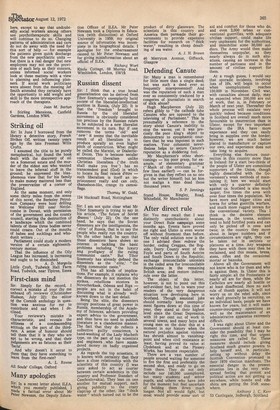After direct rule
Sir: You may recall that I was distinctly unenthusiastic about your Direct Rule campaign some months ago. Events have proved me right and Ulster is even worse off without Stormont than before. The only valid solution now is the one I advised then: redraw the border, ceding Creggan, the Bogside, Derry County west of the Foyle and parts of South Antrim and South Down to the Republic; exchange irreconcilable unionists in the ceded area for irreconcilable Republicans in the remaining British area; and restore indirect rule over the latter.
The object of this letter, however, is not to point out this self-evident fact, but to warn your readers of the very dangerous situation now developing here in Scotland. Though seasonal jobs should normally keep unemployment figures down at this time of year, they stand at their highest level since the Great Depression, with 10 per cent out of work in several towns, and many boys and young men on the dole: this at a moment in our history when the natural prejudice against violence has shrunk almost to vanishingpoint and when civil resistance at least, having proved its value at Clydebank and at the Plessey Works, has become respectable. There are a vast number of people around waiting for someone to fire the first and preferably the second shot, and ready to go on from there. They do not only include our 140,000 unemployed, but many students and senior pupils, and others who have jobs for the moment but feel uncertain of holding them down much longer. Not all would fight, but most would provide some sort of aid and comfort for those who do, and even 2,000 urban or conventional guerrillas, with adequate civilian support, could make life very unpleasant for the authorities, and immobilise some 30,000 soldiers. The Army would then make themselves unpopular, as they nearly always do in such situations, causing an increase in the number of partisans and in the amount of civilian support for them.
At a rough guess, I would say that sporadic incidents, involving loss of life, will begin to occur when unemployment reaches 150,000 in November. Civil war, with casualties almost daily, may be expected when 200,000 are out of work, that is, in February or March of next year. Thereafter the whole process will escalate very quickly indeed because conditions in Scotland are overall much more favourable to insurrection than in Ulster, except for two important factors: the IRA have more experience and they can easily bring in supplies over the border; however, we are much better placed to manufacture or capture our own, and experience does not take long to acquire.
Everything else favours insur rection in this country more than in Ireland: for a start two-thirds of the people of Ulster are committed supporters of the Union, though highly dissatisfied with the Government's weak methods of maintaining it; here we would start with only a quarter definitely against us. Scotland is also much larger; five times the area with over four times the population. We have more and bigger cities and towns for urban guerrilla warfare, and much more rugged terrain for the conventional variety. This I think is the decisive element because, in the towns, soldiers tend to hold fortified posts and can only be picked off in ones and twos; in the country they move about in larger numbers and if circumstances are right, they can be taken out in sections or platoons at a time. Any weapons they have with them may then be reclaimed, and this means, brens, stens, rifles and the occasional mortar or bazooka.
Above all the Government will not know who is for them and who is against them. In Ulster this is fairly simple: all the Protestants or nearly all are for them, while the Catholics are nearly all hostile or at least disaffected. Here no such rule of thumb applies. It will not worry us on the rebel side, since we shall generally be recruiting, on an individual basis, people we have known for years, but it will make counter-insurgency operations as well as the maintenance of an administrative apparatus extremely difficult. I was right about Ulster and the Government should at least consider the possibility that I may be right this time, and that urgent measures are called for. These measures should include giving Scotland much greater powers to help herself and, in particular, setting up without delay the Scottish Convention promised in their 1970 election manifesto. The essential danger in the present situation lies in the very widespread feeling that protest and political action are not getting us anywhere, while bombs and rifle shots are getting the Irish somewhere.
Anthony J. C. Kerr 53 Castlegate, Jedburgh, Scotland


























 Previous page
Previous page